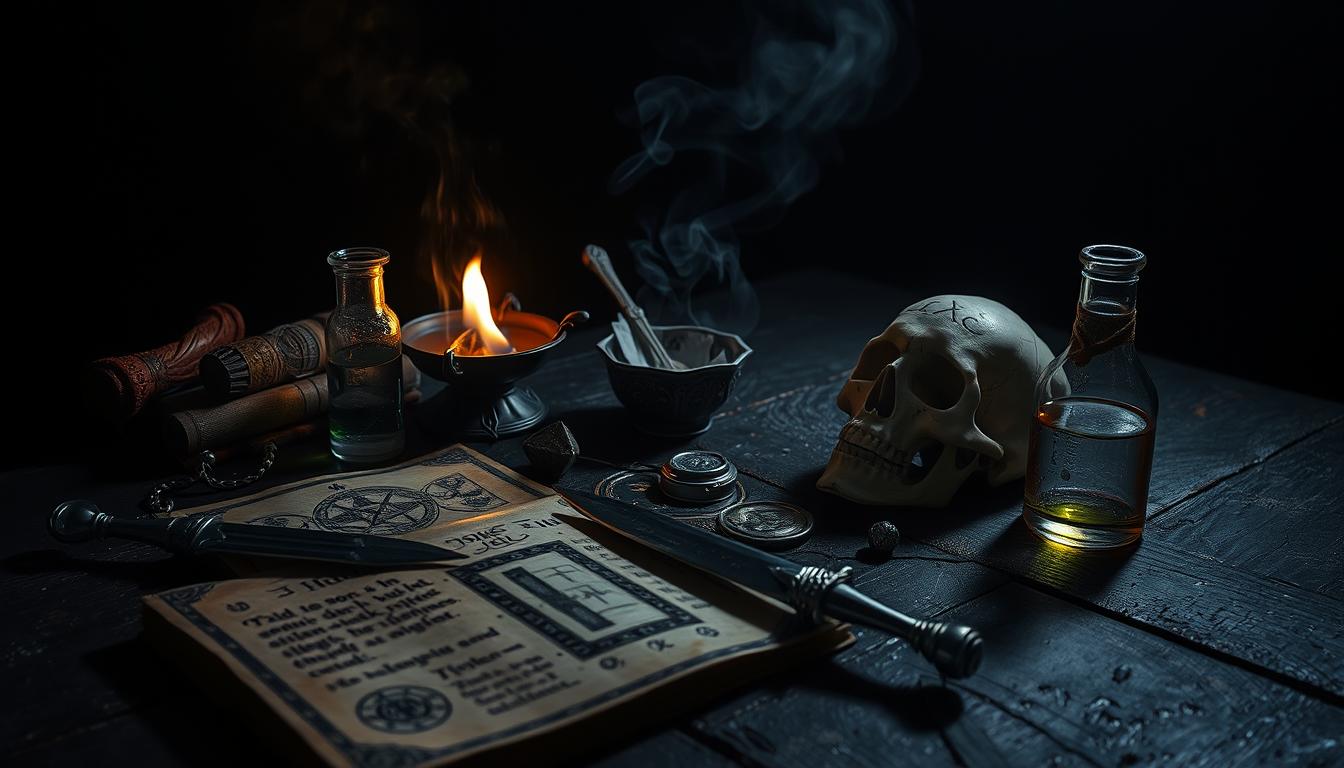Speak with Dead 5e: Another Way to Inject Exposition into a Campaign
Speak with Dead 5e: Another Way to Inject Exposition into a Campaign
Ever wondered what secrets a corpse might reveal if given the chance? As a seasoned Dungeon Master, I’ve relied on the Speak with Dead spell more times than I can count. It’s not just about asking questions—it’s about uncovering hidden truths that shape the course of an adventure.

This spell became my go-to tool for solving mysteries in D&D campaigns. Whether it’s piecing together a murder or learning a fallen warrior’s last wish, the answers often change the game. But it’s not without limits—timing, language barriers, and a corpse’s willingness to cooperate all play a role.
Later, I’ll share a shocking moment when a corpse revealed something I never expected. For now, here’s why mastering this spell is worth your time.
Key Takeaways
- The spell uncovers hidden truths from the deceased.
- Timing and cooperation affect its success.
- Practical use beats rulebook memorization.
- Answers can drastically alter campaign outcomes.
- Language barriers may limit responses.
What Is Speak with Dead 5e?
Few spells blur the line between life and death like this one. It’s a level 3 necromancy spell, letting you pry answers from those who’ve passed. But don’t expect a full resurrection—it only grants a semblance of life, just enough for whispers.

A Necromancy Spell with Limits
This magic taps into necromancy, the school of life and death. Unlike raising undead, it’s more like borrowing a voice. The corpse must have a mouth, and it won’t work on ashes or skeletons.
Key restrictions:
- 10-foot range—get close, but not too close.
- 10-minute window to ask up to 5 questions.
- Fire or acid damage? The spell fails.
- Each corpse has a 10-day cooldown.
Who Can Cast It?
Not every adventurer learns this trick. Here’s who qualifies:
| Class | Minimum Level |
|---|---|
| Bard | 5 |
| Cleric | 5 |
| Wizard | 5 |
Remember: level matters. A novice won’t cut it. And while the corpse might answer, it won’t always be friendly—or truthful.
My First Time Casting Speak with Dead
Nothing prepares you for the moment a corpse starts talking back. My hands shook as I muttered the incantation, half-expecting silence. Instead, I got a raspy whisper—and a lesson in humility.

Why I Chose This Spell
I almost picked Speak with Animals. Plants? Too leafy for clues. But the dead? They’ve seen things. I assumed answers would be straightforward, like pulling files from a dusty archive. Boy, was I wrong.
The first response felt like a riddle. No “who killed me?” clarity. Just vague hints about “shadows” and “a knife that wasn’t steel.” Turns out, corpses speculate future events about as well as drunk prophets.
The Corpse That Surprised Me
Then came the tavern owner. His body was barely cold, yet his words burned. “Ask the barkeep about the cellar,” he croaked. Confused, I did—only to find the real owner tied up below. The “corpse”? A doppelgänger.
That’s when I learned: the dead keep their quirks. Some are helpful. Others? They’d rather mess with you. Now I prep questions like a detective—and never trust a grinning corpse.
How to Prepare for Speak with Dead
Preparing to question the dead isn’t as simple as waving a wand. At my level, I’ve learned that skipping prep leads to awkward silences—or worse, a corpse that clams up. Here’s how to avoid rookie mistakes.

Gathering Components: Incense and More
Forget about casting this without burning incense. It’s the spell’s backbone. My go-to is amber resin—it lasts longer than cheap sticks. Here’s what else you’ll need:
- Rare incense types: Sandalwood for clarity, myrrh for stubborn spirits.
- A fireproof bowl (trust me, scorched tables annoy innkeepers).
- Optional: A focus item like a bone charm to boost resonance.
Pro tip: Stock up before traveling. Nothing’s worse than finding a fresh corpse and realizing you’re out of incense.
Picking the Right Corpse (And Ones to Avoid)
Not all bodies are chatty. A missing mouth? Automatic fail. Here’s my checklist:
- Preservation: Rotting corpses give vague answers. Use Gentle Repose to extend the 10-day window.
- Undead: They’re immune. If it growls, back away slowly.
- Damage: Fire or acid scars? The magic won’t take.
Once, I grabbed a “fresh” body—turned out to be a zombie playing possum. Lesson learned: check for twitching.
Casting Speak with Dead Step by Step
Casting this spell isn’t just about words; it’s a ritual of timing and technique. Miss a gesture or mumble the incantation, and you’ll get silence—or worse, a corpse that laughs at you. Here’s how to nail it.
Verbal and Somatic Components Demystified
The verbal component is Latin: “Cum Mortuis in Lingua Mortua.” Pronounce it “koom mor-too-is in lin-gwa mor-tu-ah.” Speed matters—too fast, and the magic fizzles. Too slow? The corpse might interrupt.
Your hands matter too. The somatic gestures mimic funeral rites: palms up, fingers curled like grasping a shroud. I once flubbed this and got a ghostly eye-roll. Practice before you’re knee-deep in a crypt.

Range and Duration: What You Need to Know
Stay within 10 feet—close enough to whisper, far enough to dodge if the corpse objects. The magic lasts 10 minutes, but distractions cut it short. A barking dog? A sudden storm? Your window shrinks.
Pro tip: Position yourself upwind if the body’s ripe. And always track time. I use an hourglass; sand doesn’t lie like spell timers.
Asking the Right Questions
Five questions. That’s all you get—make each one count. Corpses don’t chat forever, and their answers usually stick to what they knew life. No crystal-ball guesses about tomorrow.
Five Questions, No More—Make Them Count
I wasted my first attempt asking, “Who will betray the king?” The corpse just groaned. Later, I learned: they can’t speculate future events. Now, I use this hierarchy:
- Identity first: “Who are you?” confirms the corpse isn’t a doppelgänger.
- Cause of death: “What killed you?” often reveals the killer.
- Secrets: “What were you hiding?” uncovers new information.
Cryptic Answers? How to Decode Them
Corpses love riddles. A murdered merchant once told me, “The thief wore my face.” Turns out, it was a shapeshifter. Here’s my cheat sheet for vague replies:
| Answer | Likely Meaning |
|---|---|
| “The crow knows” | Look for a spy or a symbol (e.g., a crow crest). |
| “Beneath the broken tower” | Literal—check ruins nearby. |
| “Ask the silent one” | Someone nearby is pretending to be mute. |
Warning: Evil-aligned corpses might lie. Cross-check their answers with other clues.
Common Mistakes I’ve Made (So You Don’t Have To)
Mistakes teach more than successes—especially when dealing with the dead. My early attempts with this spell were riddled with face-palm moments. Here’s how to dodge the worst pitfalls.
Forgetting the 10-Day Rule
I once cast the spell on the same corpse twice in a week. The result? A raspy, “We *just* talked.” Turns out, each body has a 10-day cooldown (thanks, Roll20). Now I tag corpses with chalk dates like expired milk.
Assuming Corpses Know Everything
Corpses only recall within past their lifetime. Ask about future events or new information, and you’ll get blank stares. My lowlights:
- “Will the king be betrayed?” → Corpse: “I’m dead, not psychic.”
- “What’s the weather tomorrow?” → Silence. Then a fly buzzed.
Here’s what they *can’t* answer:
| Unknowable Topics | Why |
|---|---|
| Post-death alliances | No updates in the afterlife |
| Recent battles | Stuck in their timeline |
| Hidden traps (if built after death) | Zero spoilers |
Workaround: Pair with Augury or Divination spells. And yes, I now keep a “Corpse FAQ” scroll—with snark included.
Advanced Tactics for Speak with Dead
Hostile corpses won’t talk? A costume change might fix that. Beyond basic casting, seasoned necromancers use creative tricks to extract answers. Here’s how to level up your corpse-questioning game.
Using Disguise Self to Trick Hostile Corpses
Some spirits hold grudges. If a corpse snarls, Disguise Self can fool it into cooperating. In Baldur’s Gate 3, this spell bypasses hostility—real D&D works similarly. My go-to disguises:
- A friendly face: Mimic their ally (bonus points for bloodstains).
- Authority figures: Guards or priests often command respect.
- Silent monks: Less talking, fewer slip-ups.
One time, I posed as a victim’s spouse. The corpse wept—then revealed the assassin’s name. Morally gray? Maybe. Effective? Absolutely.
Storing Corpses for Later Use (Yes, Really)
Need a corpse on a long rest cooldown? Pack it in a travel chest. In-game, this preserves bodies; tabletop DMs may allow it with Gentle Repose. Ethics aside, here’s how:
| Storage Method | Pros | Cons |
|---|---|---|
| Portable Hole | No smell, spacious | Expensive |
| Bag of Holding | Convenient | 10-minute air limit |
| Ice Magic | Preserves freshness | Melts in deserts |
In Forgotten Realms, Tessaril Winter’s guild hoarded bodies for intel. Just don’t forget which chest holds your lunch.
Recasting and Lore Connections
Out of spell slots? A scroll lets you recast without rest. Pair with Augury to verify cryptic answers. For lore buffs, the Forgotten Realms offers rich precedents—like the Zhentarim’s corpse spies.
Pro tip: Label stored corpses. “Bob – knows about the cult” beats “Mystery Corpse #12.”
When Speak with Dead Fails—And How to Fix It
Even the most skilled casters hit roadblocks with necromancy. Corpses refuse to talk, spells fizzle, and sometimes you get cursed instead of answers. Here’s how I troubleshoot failures.

Undead and Damaged Corpses
Undead creatures laugh at this spell. Zombies? Ghouls? Save your incense. For regular corpses, damage matters. A fire-scorched jaw or necrotic decay ruins the magic.
| Damage Type | Effect | Workaround |
|---|---|---|
| Fire/Acid | Destroys mouth | Find fresher corpse |
| Necrotic | Blocks resonance | Remove cursed flesh |
| Blunt Force | Intact? Works | Realign jawbone |
Dealing With Uncooperative Spirits
Some souls just won’t chat. Try these ritual tweaks:
- Burial rites: Whisper prayers to appease them.
- Divine focus: Use holy spheres (Forgotten Realms trick).
- Bribes: Offer gold or promises like “I’ll avenge you.”
For truly stubborn cases, switch spells. Speak with Plants works if the victim’s nearby roses saw the murder. Or try Stone Tell if they died near rocks.
Homebrew fix: My DM lets us roll Persuasion against the corpse’s Wisdom. Nat 20? It spills secrets like a tavern drunk.
Creative Uses Beyond the Obvious
The dead hold more than just bones—they carry stories that reshape entire campaigns. I’ve turned corpse interrogations into full-blown murder mysteries and unearthed Forgotten Realms secrets buried for centuries. Here’s how to push this spell further than the rulebook suggests.
Solving Murders in Your Campaign
In Waterdeep, I recreated a noir-style investigation using a victim’s testimony. The corpse revealed three clues: a tattoo, a whispered name, and a broken dagger. Players pieced together a noble’s assassination plot—far juicier than “go kill the bandits.”
Pro tips for murder plots:
- Stage the scene: Leave physical evidence (e.g., a scroll fragment) to cross-reference.
- Use multiple corpses: A guard might’ve seen the killer’s face; the victim knew their motive.
- Time limits: A decaying body means fading memories—add urgency.
Lore Diving in Forgotten Realms
The Forgotten Realms teems with corpses who witnessed history. In Arrabar, the City Guard used this spell to solve cold cases. Tessaril Winter’s arcane variant even tapped into spheres of lost knowledge.
My favorite finds:
| Corpse Type | Lore Uncovered | Campaign Impact |
|---|---|---|
| Ancient Elf Scholar | Dragon cult rituals | Unlocked a hidden temple |
| Murdered Merchant | Zhentarim trade routes | Redirected the party’s mission |
| Fallen Paladin | Order of the Gauntlet secrets | Exposed a traitor |
Pair with library research or Legend Lore to verify details. Just don’t expect ghosts to cite their sources.
Conclusion
Unlocking secrets from beyond the grave changed how I play D&D forever. This spell isn’t just a tool—it’s a game-changer. From decoding a grinning corpse’s riddles to solving murders, every cast teaches something new.
Remember: five smart questions, fresh bodies, and creativity trump raw level. But tread lightly—necromancy bends the rules of life and death. Your next campaign could hinge on one whispered clue.
Ready to try it? Share your wildest corpse stories below. And stay tuned—next time, we’ll dig into Speak with Plants. (Spoiler: roses gossip worse than bards.)